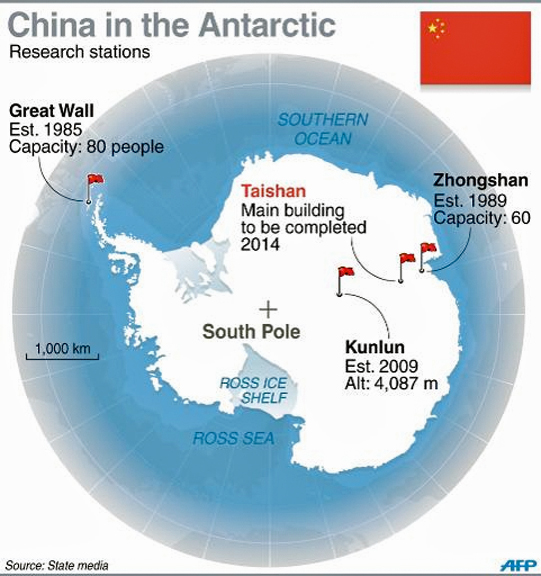
[SatNews] Originally reported by The Sydney Morning Herald, and added to by Andrew Draby of the Wauchope Gazette, China has disclosed plans to install a satellite facility in Antarctica, heightening concerns about militarization of the "peaceful" continent.
The Australian Strategic Policy Institute has warned of pressures on demilitarization of the frozen south, in part caused by developments such as satellite systems. The BeiDou facility will join others including Norway's Stroll, strategically located in Antarctica to fit their global networks—but which are claimed to breach the Antarctic Treaty.
Norwegian Bard Wormdal, author of The Satellite War, told Fairfax Media, "The Chinese military wants to use BeiDou, for instance, for guiding all sorts of missiles. A BeiDou base in Antarctica makes the system more reliable and precise." He first raised alarm over the Norwegian satellite base at its Troll Antarctic station, which he found had been used by the U.S. National Geospatial Intelligence Agency. "Warfare today is totally dependent on space and ground stations for satellites," he added. "The new Chinese base installation is part of the militarisation of Antarctica, and a violation of the Antarctic Treaty."
BeiDou is intended to give China independence from other satellite navigation systems, such as the United States' GPS, by 2020. The facility at Great Wall station in Antarctica will include receivers, auxiliary equipment and a reference station key to improving BieDou's accuracy, according to the Chinese enews.com website, where the project leader, Wu Xuefeng, is quoted as saying the BeiDou facility would greatly improve China's Antarctic mapping autonomy and improving the system's precision.
A U.S. study of the BeiDou system found earlier this year it was a strategically important dual-use technology program. "First and foremost (it is) intended to enable the Chinese military to conduct modern war, but is also recognized as supporting the development of a new commercial industry vital to China's national infrastructure," said the study's author, the University of California's Kevin Pollpeter, who also told Fairfax he would be surprised if China had military designs on the Antarctic, or that BeiDou was part of such an ambition. "Other countries use GPS for their research in the Antarctic and I suspect Chinese researchers plan to do the same type of research, but with BeiDou," Mr. Pollpeter said. "Unlike GPS, which has an accuracy of several meters, BeiDou has a 10 meter accuracy, but that is being improved in China and other countries with the installation of reference stations that boost accuracy to one meter."
Antarctic political analyst Alan Hemmings, of the University of Canterbury, said the 1959 treaty was ambivalent, as it allowed for nations to use military logistical support. "The essential difference is whether it will be used for peaceful purposes, and that's quite hard to prove against, without compelling evidence," Dr. Hemmings said.

